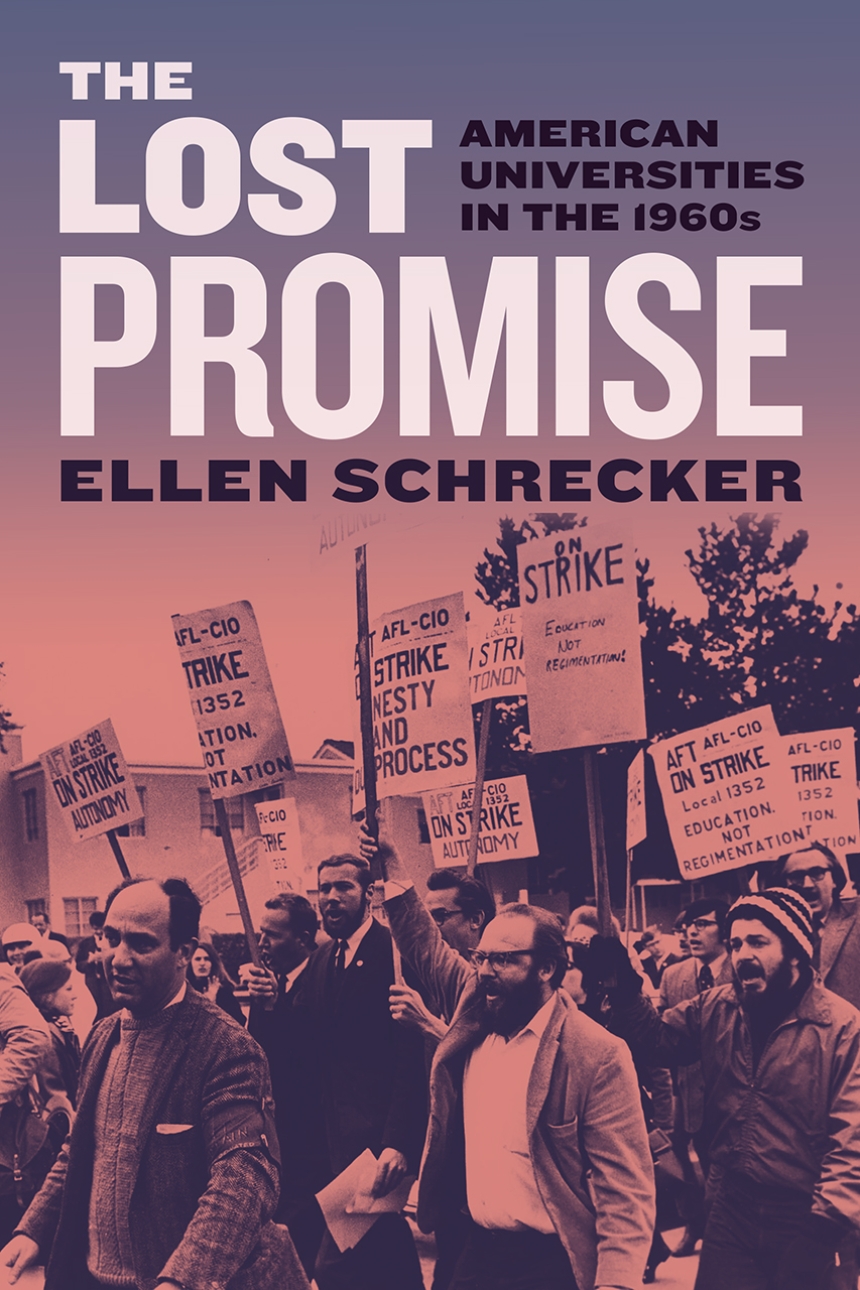Jo Freeman Writes: The Lost Promise, American Universities in the 1960s by Ellen Schrecker
By Jo Freeman
The Lost Promise: American Universities In The 1960s 
By Ellen Schrecker
University of Chicago Press, 2021
621 pages with photographs
This is a book about protests – which is the historical memory of what the 1960s was all about. It is also a book about professors. They are the prime subjects of the author’s chapters, even though students were often the prime actors.
The author sees the 1950s and 1960s as the golden age for colleges and universities, but it didn’t last. The issues which divided the country also divided faculties, often leading to vicious power struggles and a backlash.
World War II made the difference. That conflict brought government money to scientists and the G.I. bill brought tuition payments to veterans. Money moved colleges and universities from being a finishing school for gentlemen to being a “multiversity” where the “knowledge industry” was a major source of revenue, progress, prestige and upward mobility.
There was a dark side. The end of WWII brought the cold war and a fear of “Communism.” This led to anti-communist loyalty oaths and, eventually, the war in Viet Nam. Over one hundred faculty were fired in the 1940s and 1950s for espousing political views unacceptable to government agencies and higher ed administrations. “Academic freedom” was a myth.
The 1950s also gave rise to the civil rights movement and with it student protest. The students weren’t alone. Even faculty who agreed that discrimination was bad and the war was imperialistic divided over how to deal with students who sat-in or went on strike. Direct action certainly made it hard to teach or do research or the other things colleges were set up to do.
The author says “The Student Movement Begins” with the Berkeley Free Speech Movement in 1964. As an FSM alum and a student of social movements, I know that the FSM may have been the biggest and best publicized student protest of the decade, but it was hardly the first. As I pointed out in my book At Berkeley in the Sixties, we were inspired by the civil rights movement, which all of us had followed in the news and many of us had participated in when it came to the Bay Area in earlier years.
The author has a lot to say about faculty fights, which were really nasty. The old guard wanted to return to traditional ways, while the new professorate wanted to use the institution to bring liberation and equality to the country. They really believed that ideas alone could change the world. Many radical caucuses were formed in the various disciplines, some of which broke away from their parent associations and some of which agitated within them. New journals were formed to publish critiques of US society.
She has less to say about taxpayers, which polls clearly showed were angry at student protests. Those taxpayers elected officials who cut budgets and raised tuition. The result was that students had to take out loans to get the same degrees that my generation could get with minimal financial outlay. Their professors were more likely to be adjuncts, who work for little pay and no job security. Today, roughly half of college teachers are adjuncts and their numbers go up every year.
It took a couple decades, but subsequent generations of students were penalized for what my generation did.
Copyright © 2022 Jo Freeman
More Articles
- Jo Freeman Reviews Vice President Kamala Harris: Her Path to the White House
- Kristin Nord Writes: My Mother As a Young Widow Restarted Her Life Again in Midlife; I Began to Follow in Her Footsteps
- Jo Freeman: Five Days in DC Where the Post-election Protests Were Puny but the Politics Were Not
- Attorney General Barr Testifies on Justice Department Mission and Programs: Watch From the Beginning
- Searching Still Photographs for Army Personalities: At the Still Picture Branch at the National Archives, You Can Find Personality Indexes Aiding the Search for Specific Individuals in the Military
- Julia Sneden Wrote: Remembering ... On a Day Once Known as 'Decoration Day'
- American Archives Month: FDR’s White House Map Room
- Going Forth On the Fourth After Strict Blackout Conditions and Requisitioned Gunpowder Had Been the Law
- A Jo Freeman Review of Won Over: Reflections of a Federal Judge from Jim Crow Mississippi
- Did You Remember that It Has Been Proposed That We Privatize the Postal Service? Who Is Handling These Dangerous Packages Now?






